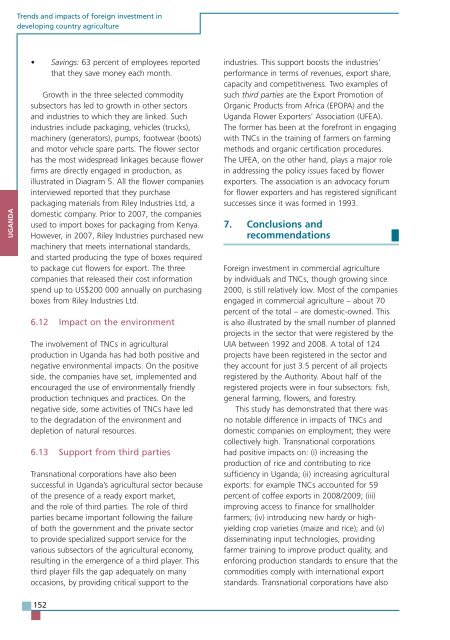TRENDS AND IMPACTS OF FOREIGN INVESTMENT IN DEVELOPING COUNTRY AGRICULTURE
TRENDS AND IMPACTS OF FOREIGN INVESTMENT IN DEVELOPING COUNTRY AGRICULTURE
TRENDS AND IMPACTS OF FOREIGN INVESTMENT IN DEVELOPING COUNTRY AGRICULTURE
You also want an ePaper? Increase the reach of your titles
YUMPU automatically turns print PDFs into web optimized ePapers that Google loves.
UG<strong>AND</strong>A<br />
Trends and impacts of foreign investment in<br />
developing country agriculture<br />
Savings: 63 percent of employees reported<br />
that they save money each month.<br />
Growth in the three selected commodity<br />
subsectors has led to growth in other sectors<br />
and industries to which they are linked. Such<br />
industries include packaging, vehicles (trucks),<br />
machinery (generators), pumps, footwear (boots)<br />
and motor vehicle spare parts. The flower sector<br />
has the most widespread linkages because flower<br />
firms are directly engaged in production, as<br />
illustrated in Diagram 5. All the flower companies<br />
interviewed reported that they purchase<br />
packaging materials from Riley Industries Ltd, a<br />
domestic company. Prior to 2007, the companies<br />
used to import boxes for packaging from Kenya.<br />
However, in 2007, Riley Industries purchased new<br />
machinery that meets international standards,<br />
and started producing the type of boxes required<br />
to package cut flowers for export. The three<br />
companies that released their cost information<br />
spend up to US$200 000 annually on purchasing<br />
boxes from Riley Industries Ltd.<br />
6.12 Impact on the environment<br />
The involvement of TNCs in agricultural<br />
production in Uganda has had both positive and<br />
negative environmental impacts. On the positive<br />
side, the companies have set, implemented and<br />
encouraged the use of environmentally friendly<br />
production techniques and practices. On the<br />
negative side, some activities of TNCs have led<br />
to the degradation of the environment and<br />
depletion of natural resources.<br />
6.13 Support from third parties<br />
Transnational corporations have also been<br />
successful in Uganda’s agricultural sector because<br />
of the presence of a ready export market,<br />
and the role of third parties. The role of third<br />
parties became important following the failure<br />
of both the government and the private sector<br />
to provide specialized support service for the<br />
various subsectors of the agricultural economy,<br />
resulting in the emergence of a third player. This<br />
third player fills the gap adequately on many<br />
occasions, by providing critical support to the<br />
152<br />
industries. This support boosts the industries’<br />
performance in terms of revenues, export share,<br />
capacity and competitiveness. Two examples of<br />
such third parties are the Export Promotion of<br />
Organic Products from Africa (EPOPA) and the<br />
Uganda Flower Exporters’ Association (UFEA).<br />
The former has been at the forefront in engaging<br />
with TNCs in the training of farmers on farming<br />
methods and organic certification procedures.<br />
The UFEA, on the other hand, plays a major role<br />
in addressing the policy issues faced by flower<br />
exporters. The association is an advocacy forum<br />
for flower exporters and has registered significant<br />
successes since it was formed in 1993.<br />
7. Conclusions and<br />
recommendations <br />
Foreign investment in commercial agriculture<br />
by individuals and TNCs, though growing since<br />
2000, is still relatively low. Most of the companies<br />
engaged in commercial agriculture – about 70<br />
percent of the total – are domestic-owned. This<br />
is also illustrated by the small number of planned<br />
projects in the sector that were registered by the<br />
UIA between 1992 and 2008. A total of 124<br />
projects have been registered in the sector and<br />
they account for just 3.5 percent of all projects<br />
registered by the Authority. About half of the<br />
registered projects were in four subsectors: fish,<br />
general farming, flowers, and forestry.<br />
This study has demonstrated that there was<br />
no notable difference in impacts of TNCs and<br />
domestic companies on employment; they were<br />
collectively high. Transnational corporations<br />
had positive impacts on: (i) increasing the<br />
production of rice and contributing to rice<br />
sufficiency in Uganda; (ii) increasing agricultural<br />
exports: for example TNCs accounted for 59<br />
percent of coffee exports in 2008/2009; (iii)<br />
improving access to finance for smallholder<br />
farmers; (iv) introducing new hardy or highyielding<br />
crop varieties (maize and rice); and (v)<br />
disseminating input technologies, providing<br />
farmer training to improve product quality, and<br />
enforcing production standards to ensure that the<br />
commodities comply with international export<br />
standards. Transnational corporations have also


